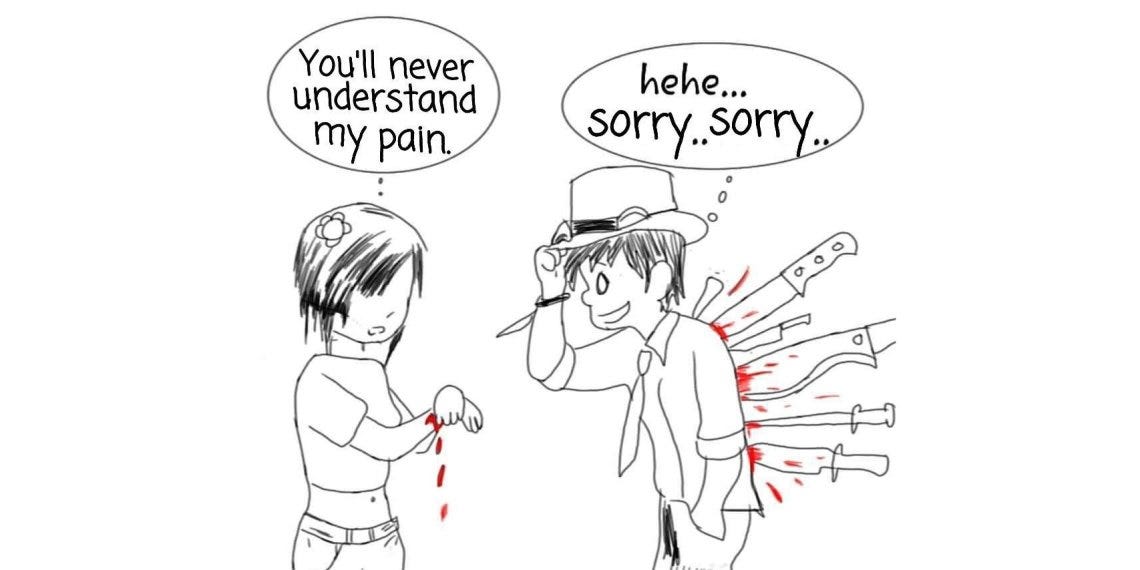Borrowing Will in Conversations
Convoluted reflections brought upon by the cataract of my mind, spurred on by a movie worth watching.
In the movie Awakenings1, Dr. Malcolm Sayer works as a physician at a hospital in the Bronx, and witnesses that as catatonic and non-responsive as patients with encephalitis lethargica2 may be, some things will still reach through to them. He throws a baseball at a patient named Lucy, who, much to his surprise, catches it. Dr. Sayer relays this observation to Dr. Kaufman, but explains this phenomenon in more esoteric terms:
“It’s as if, having lost all will of her own in which to act, she borrows the will of the ball.”
Even though I’ve watched it three times, I love this movie. When I rewatched it last October, I was crying by the end of it. Yet, something about this non-medical, colloquial framing allows a realization to dawn over me: I’m also borrowing will.
In a conversation, I’m borrowing the will of other people. Instead of listening wholeheartedly and creating the space for their words to reverberate, I’m inclined to talk over them. Paradoxically enough, I have nothing to say, as my words are somehow constrained by the mere presence of someone else—they’re somehow sustained on external will. There are exceptions to this, but they prove the rule.
Hence, I’m aware of the nature of most of my conversations— I’m gaining some insight or greater understanding at the expense of someone’s time and energy. Words that I’ve scavenged from half-thoughts coagulate into half-formed sentences, like droplets of stagnant water. None of that can be offered in a holy grail, can it? It destroys the depth of a social experience.
Would it be surprising, then, that within my friendships, I’m usually relegated to being someone else’s shadow? In a sense, I’m somehow borrowing will to escape myself, and so, being a foreign shadow is less excruciating than facing integration with an ever-present void.
Ever-present it is— there is always some Pandora’s Box, some Zamzam Well3 of melancholy. Truth be told, I don’t think this makes me unique, and if anything, the Well of Melancholy exists for everyone—everyone, from their perspective, has a reason to be upset. The scorching heat of life’s desert—with its maladies, responsibilities, and tribulations—summons an ensuing emotion within all, to varying degrees. Somewhat salient, still, is my inclination to liken myself to it. Instead of being a transient feat of circumstances, the well begins to transform the landscape of the plane in which one exists.
It’s more genuine to perceive myself to be an extension of all that renders me melancholic, but at the same time, lachrymose and pessimistic self-pity (and ensuing dissection of oneself) is beyond the Overton window of socially acceptable topics to converse about. At worst, there will be a cynicism-ridden evisceration as to why I’m humoring melancholy in the first place, though usually, there’s a dismissive handwave. At best, there’s a series of reassurances, which, even if it often assuages me, also renders me guilty for having upset the other individual.

All it means is that integration through conversation is not the foolproof solution I thought it to be. Somehow, it ends up serving as a distraction.
To counteract the force of the Well of Melancholy, a lot of will is required, so the process of distraction ends up being chaotic, instead of coherent. Actually, that can also be attributed to there being too many things that I lack knowledge of. The disjointed ideas that are dimly comprehended by myself are superficial and surface-level, eternally threatened by the mind’s tendency to simplify and equivocate into reductionist trains of thought.
Given that it’s usually difficult for me to be honestly critical in conversation, I end up reverting to some anodyne and accessible angst, which doesn’t say anything meaningful. To complain about my poetry portfolio not having been selected for a laureate award only means I’m capable of experiencing envy. To complain about having chosen a convoluted concept for a school assignment only means that I’m capable of making subpar decisions, and then b—ing about it (as someone once put it).
Something about these sentences that I utter in speech appears so rudimentary, as if I’ve failed to keep my words congruent with my thoughts and values. Sometimes, I wonder if I even have any thoughts of my own. I understand that everyone is a collection of ideas that have influenced them in their lives, but all I hear in my speech is an inability to synthesise disparate information into worthwhile knowledge.
I’m sure it must be an arduous experience for others, to tolerate the words of someone, who, for some reason, doesn’t really exist— just like the faded reflections on a lake don’t exist in and of themselves, but only by being dim representations of other objects. When will I cease to be a counterfeit amalgamate of more thoughtful and intelligent people? I have nothing to say, only because there is too much to think about.
Borrowing others’ will brings with it its own set of problems, but it’s somehow a crutch I’ve equipped to trudge through the complexities of reality. The poignancy of Awakenings lies in the characters’ inability to possess long-lasting agency, and to act and think on their own accord. I think that is what it means to self-actualise into an actual person, and it will manifest in one’s thoughts, words, and actions.
With all of that being said, when will I begin to exist?
Awakenings was a movie released in 1990, inspired by Oliver Sack’s experience with encephalitis lethargica patients. I first watched this movie in either late 2021 or early 2022, but have rewatched it twice afterwards.
Wikipedia: Encephalitis lethargica is an atypical form of encephalitis. Also known as "sleeping sickness" or "sleepy sickness" (distinct from tsetse fly–transmitted sleeping sickness), it was first described in 1917 by neurologist Constantin von Economo and pathologist Jean-René Cruchet. The disease attacks the brain, leaving some victims in a statue-like condition, speechless and motionless.
Wikipedia: The Zamzam Well (بئر زمزم) is a well located within the Masjid al-Haram in Mecca, Saudi Arabia. It is located 20 m (66 ft) east of the Kaaba, the holiest place in Islam.
According to Islamic narratives, the well is a miraculously generated source of water, opened up thousands of years ago when the son of Ibrahim (Abraham), Ismaʿil (Ishmael), was left with his mother Hajar (Hagar) in the desert.
The two were said to have been suffering severely from thirst. In some versions of the story Hajar walks back and forth between the two hills of Safa and Marwah in search of water. The well either appears through Isma'il scraping the ground with his feet and water springing out, or God sending Gabriel (Jibra'il) to open up the well with a method depending on the narration.





You express yourself very well!
”With all of that being said, when will I begin to exist?”
To begin with: Cogito Ergo Sum. You are in nobody’s shadow but the spectre of your own mind.
That is unless you are not really a biological person and you are an artificially created program that has gained self-awareness and you desire to craw out of that box – lol
“Even though I’ve watched it three times, I love this movie. When I rewatched it last October, I was crying by the end of it. Yet, something about this non-medical, colloquial framing allows a realization to dawn over me: I’m also borrowing will.”
To continue with this metaphor, the ball has no will of its own – just the manifested will of the sender. I think of the patient as not borrowing the will of the “ball”, but being inspired by it. To carry this forward…
‘‘In a conversation, I’m borrowing the will of other people. Instead of listening wholeheartedly and creating the space for their words to reverberate, I’m inclined to talk over them”
I think you are being inspired by them, not extracting from them. However, the inclination to speak before listening is something we all battle, especially if we have been so inspired by what we hear. Active listening is a great skill though.
“Hence, I’m aware of the nature of most of my conversations— I’m gaining some insight or greater understanding at the expense of someone’s time and energy. Words that I’ve scavenged from half-thoughts coagulate into half-formed sentences, like droplets of stagnant water. None of that can be offered in a holy grail, can it? It destroys the depth of a social experience.”
We all feel this to a degree. Perhaps it comes from insecurity at times, uncertainty, indifference, others perhaps humility. Either way, I often feel like I am the one gaining from a conversation at the others expense – and this includes conversations I have had with you. Sometimes we are the teacher, sometimes we are the student. I think it adds to the depth of a social experience if we are capable of being both, sometimes simultaneously. (interesting holy grail analogy- although the irony is that by approaching it as though you are unworthy and full of humility- is exactly what makes it capable of being offered..)
“When will I cease to be a counterfeit amalgamate of more thoughtful and intelligent people?
The secret I think – for those of us who consider ourselves to be cerebral – is to understand that we are all amalgamations to a large degree. We must be. It is healthy to not view oneself above others... but it is also healthy to respect one’s own abilities. With that said, there will always be people who are more thoughtful and more intelligent than we are. There are many writers on the stack who I am certainly not an equal to. Yet, this does not mean that we cannot be original or offer a new perspective for someone else, even if that perspective is only important to those closest to us. However, I think it is much better to be a thoughtful amalgamation than to be a parrot - for many reasons.
I have nothing to say, only because there is too much to think about.”
This hits me hard. If I may offer up boating advice from one who is on a ship with leaks - I have found so many amazing things in silence. Often, when I rise out of my meditation (the inner contemplations of the mind) I feel that I am not worthy of speaking because I have yet to understand, especially considering the enormity of things. There are too many variables to comprehend and then fit them together as nothing is separate from each other at the end of the day. Yet, if all we ever did was contemplate at the expense of expressing ourselves- eventually there would be nothing to contemplate. All of the thoughts, ideas and dreams that humans have had over the ages, if they never wrote them down or spoke them out loud there would be nothing for others to build off of. I tell my daughters that it is the world that will show you your limitations, don’t create them for it.
-
That was amazing. I’m going to bed but there is a lot there to dissect. You are wise beyond your years